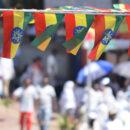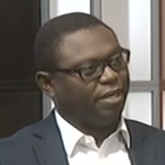A Review of Theodore Trefon’s “Congo Masquerade”: Making Sense of Failure – By Henning Tamm

 Why does the vast majority of the Congolese population continue to live in abysmal poverty despite the country’s enormous resource wealth? How can violence continue in a country that is host to the world’s biggest UN peacekeeping operation? Why have years of large-scale international efforts at “˜state-building’ achieved so little in the Democratic Republic of Congo (DRC)? These are some of the big questions Theodore Trefon’s small new book tries to tackle.
Why does the vast majority of the Congolese population continue to live in abysmal poverty despite the country’s enormous resource wealth? How can violence continue in a country that is host to the world’s biggest UN peacekeeping operation? Why have years of large-scale international efforts at “˜state-building’ achieved so little in the Democratic Republic of Congo (DRC)? These are some of the big questions Theodore Trefon’s small new book tries to tackle.
When I first saw the book’s title, Congo Masquerade: The Political Culture of Aid Inefficiency and Reform Failure, I was sceptical. Culture is a much-abused and problematic term, not least in the context of failed development. And, indeed, one may wonder how useful it is to conceive of “political exclusion, manipulation of rumour, secrecy, (dis)information, repression, corruption and predation” as “instruments of political culture” (p. xiii). Later in the book, Trefon refers to this cluster of issues as “entrenched patterns of Congolese cultural specificity” (p. 107). Again, the wording seems unfortunate to me. But these are largely (academic) concerns about labelling. What Trefon describes is, in substance, very similar to what Jason Stearns has in mind when he talks of the Congolese “political system,” Stearn’s starting point for understanding the Congo Wars (see our review). In fact, Trefon’s substantive arguments are also broadly in line with political-economy approaches that explain why it is rational for politicians in weak states to reproduce this weakness rather than build a strong state and foster economic development (see Pierre Englebert’s Africa: Unity, Sovereignty, Sorrow). These arguments deserve a broader audience, and Trefon’s well-written and accessible volume will hopefully be read not only by academics but, more importantly, by policymakers and aid practitioners.
What, then, are Trefon’s main arguments? First, the state-building project that was launched in the DRC at the beginning of the transition in 2003 can be understood as a masquerade in which not only the Congolese authorities but also the international partners are involved. While Trefon is aware that some might find this analogy insensitive, he stresses the importance of hypocrisy and the art of the unsaid – defining features of masquerade – for the failure of state-building. The Congolese government pretends to be in favour of an externally imposed agenda but, at the same time, actively works against its successful implementation. Effective reforms would threaten the government’s political survival. Trefon also deems international partners guilty of masquerade, yet the analogy works less effectively in some of these cases.
Second, the key failure of international partners has been to pay too little attention to how politics in the DRC actually operates and to have too much trust in imported reform templates. (Some of Trefon’s analysis in this regard echoes Séverine Autesserre’s The Trouble with the Congo.) Thus, there is no shared vision among donors and Congolese authorities, leading at best to a situation of change without progress and at worst to a situation of “one step forward, two steps back” (p. 15). Trefon also highlights competition as an obstacle to reform. Emphasizing the complexity of state-building, he provides a simple but extremely useful distinction of competition at three different levels: among international actors, between international and Congolese actors, and among Congolese actors. Analysts often overlook at least one of these dimensions.
Third, and related to the first two points, Trefon argues that “culture matters” (chap. 5). He describes corruption and predation as a twin pattern that emerged during the colonial period and has been reproduced under Mobutu, Laurent Kabila, and Joseph Kabila. This historically entrenched pattern of doing politics thus constitutes Congo’s “political culture,” which in turn explains why donor-driven and context-insensitive reforms are bound to fail. The president is primarily concerned with consolidating his power, operating through a small circle of advisers rather than through his cabinet or the parliament. This clique prizes secrecy: two of the most important decisions in recent years, the development deal with China and the rapprochement between the presidents of the DRC and Rwanda, have been made without consulting either the relevant ministries or parliament. At the administrative level, poorly paid civil servants continue to operate on the basis of the “help yourselves” mantra that became infamous during the Mobutu period. For normal citizens, this means that they have to engage in lengthy negotiation processes with state officials, who are seen as predators rather than service providers. Having outlined this political system, the author ends on a devastating note: “Although good governance has to be the foundation of institutional reform, there are no realistic strategies to force those at the top to abandon their corrupt practices.” (p. 121)
Trefon doesn’t provide a list of policy prescriptions; rather, his analysis should be seen as a critical reflection on the current condition of the state-building project in the DRC. In a conversation I had in eastern Congo this summer, aid workers complained that their organization had not provided them with useful background readings on the country before they began their stints. There are good reasons for why both governmental and nongovernmental agencies should assign Trefon’s 130-page book. Apart from offering the critical analysis that I have sketched above, the book includes very informative sections on the importance of infrastructure and transportation; security sector reform; the UN peacekeeping missions; decentralization; and industrial logging. It also provides succinct discussions of other recent developments and events, such as the growing Chinese involvement or Floribert Chebeya’s murder in June 2010 and its impact on Congo’s fiftieth anniversary of independence.
For Congo experts and more theoretically minded readers, this book will be less rewarding. Trefon’s analysis of Congolese politics is pertinent but adds little to the existing academic literature. Likewise, his claim to be “offering a theoretical framework” (p. ix) is a bit of a stretch; the masquerade metaphor is interesting but theoretically underdeveloped, and his insistence on political culture does not amount to a systematic framework. But there is only so much one can do on 130 pages, and I believe revolutionizing academic debates was not what Trefon had in mind when writing this book.
Interestingly, despite all the damning criticism of the international involvement in the DRC, the author never seriously discusses the option of simply “getting out.” In the conclusion, he writes: “Momentum for positive change results from people and their social dynamism, not from government or external interventions. The Congo state is indeed failed, but in striking contrast, Congolese society is strong, tolerant, creative, generous and vibrant” (p. 125). It seems there still is a certain idealism left in Trefon that makes him hope international partners will eventually find more successful ways of supporting agents of change within Congolese civil society. We can but hope that he is right.
Henning Tamm is a doctoral candidate in International Relations at St Antony’s College, University of Oxford, and co-convenor of the Oxford Central Africa Forum (OCAF). His dissertation project deals with alliances between governments and foreign rebel groups in Central Africa since 1990. He has conducted field research in the DRC, Rwanda, and Uganda.






